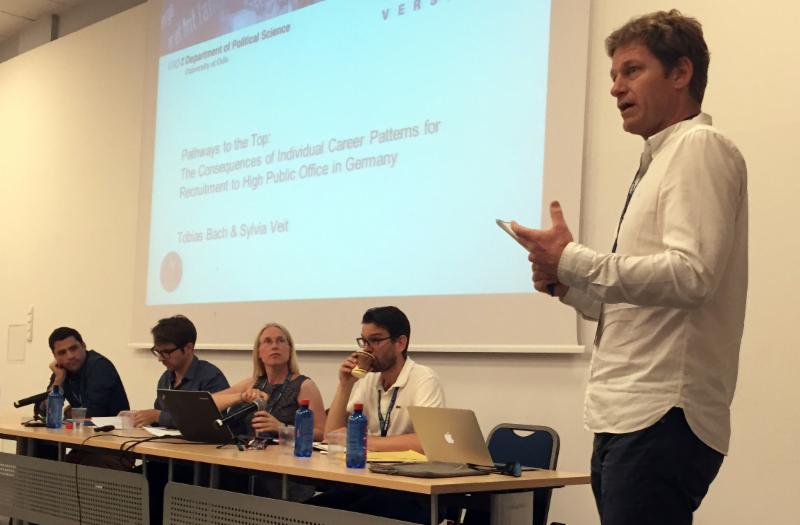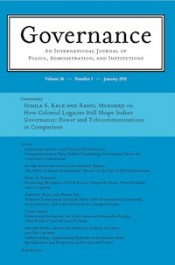Archive for the ‘SOG news’ Category
CFP: Public management and institutional quality
The Structure and Organization of Government section of the International Political Science Association, together with the Quality of Government Institute at the University of Gothenburg, invite you to submit a paper for a workshop on Public Management and Institutional Quality. The workshop will be held on June 7-8, 2017. More details about the call for papers here.
Aberbach and Laegreid receive Kloeti award
 |
|
|
Jan Meyer-Sahling introduces a SOG panel at IPSA meeting in Poznan, Poland in July
|
SOG seeks new editors for Governance
SOG, the academic sponsor of Governance, is seeking a new editorial team for the journal, to begin in January 2018. More details here.
New book by SOG author: Organizing for Coordination
 SOG member Per Laegreid is one of the editors of Organizing for Coordination in the Public Sector, just published by Palgrave Macmillan. Details about the book. “This important collection is comprised of 20 European case studies; it offers valuable insights into public sector coordination and points to important lessons for devising and implementing new coordination instruments.”
SOG member Per Laegreid is one of the editors of Organizing for Coordination in the Public Sector, just published by Palgrave Macmillan. Details about the book. “This important collection is comprised of 20 European case studies; it offers valuable insights into public sector coordination and points to important lessons for devising and implementing new coordination instruments.”
SOG is the IPSA Research Committee on the Structure and Organization of Government. It is the academic sponsor of Governance. SOG members can have new books featured in this newsletter. Join SOG for $31 | £23 | €32.
SOG research committee has successful meeting at IPSA World Congress
The IPSA Research Committee on Structure and Organization of Government (SOG) held ten panels during the 23rd IPSA World Congress 2014 that took place in Montreal, Québec, Canada on 19-24 July. These panels entailed various themes such like Administrators at the Top (Recruitment Patterns, Career Paths, Role Perceptions and Politicization of Senior Bureaucrats); Organizing for Internal Security and Crisis Management; Analysing International Transfers from the Inside: Public Administration Reforms in Post-communist Europe; The Reciprocal Influence of Policies and Administrative Networks; The Moral and Ethical Implications of Accountability: Theory and Practice; The Politics of Selection at the Top of Ministerial Bureaucracies; Local Institutions and Participation in Urban Settings; The Study of the Structure of Government: A Field in Search of a New Agenda?; The Effects of Delegation on Bureaucratic Influence over Policy-making. See details about all panels here. Around sixty participants including chairs, paper givers and discussants, presented their on-going work and communications. The event took place in the Palais des Congrès of Montreal in the City Center and a SOG diner was organized on 22 July.
SOG project announces research positions
The Structure and Organization of Government Project (SOG‐PRO) is a collaborative research programme that is recently jointly funded by the national scientific research foundations of the Netherlands (NWO), France (ANR), Germany (DFG), and the United Kingdom (ESRC) under the Open Research Area Plus programme. SOG‐PRO aspires to develop and search for innovative ways to describe and understand the organizational dynamics at the level of central government. The project starts on 1 September 2014 and will run for three years. To this end the research teams are looking for highly qualified and motivated researchers at the postdoc and PhD levels. The candidates should have a background in the social sciences, preferably public administration, political science or sociology. The quantitative and qualitative aspects of the research project are equally important, so proficiency in mixed method approaches is highly preferred. Learn more about the available positions.
APJPA remembers Bowornwathana
 The Asia Pacific Journal of Public Administration has published a special issue comprised of articles written by Bidhya Boworwathana of Thailand’s Chulalongkorn University. Professor Bowornwathana passed away in August 2013. Governance has also published a note remembering Professor Bowornwathana, who was actively involved in the IPSA Structure and Organization of Government Research Committee, the academic sponsor of Governance. The special issue includes an article originally written for Governance.
The Asia Pacific Journal of Public Administration has published a special issue comprised of articles written by Bidhya Boworwathana of Thailand’s Chulalongkorn University. Professor Bowornwathana passed away in August 2013. Governance has also published a note remembering Professor Bowornwathana, who was actively involved in the IPSA Structure and Organization of Government Research Committee, the academic sponsor of Governance. The special issue includes an article originally written for Governance.
